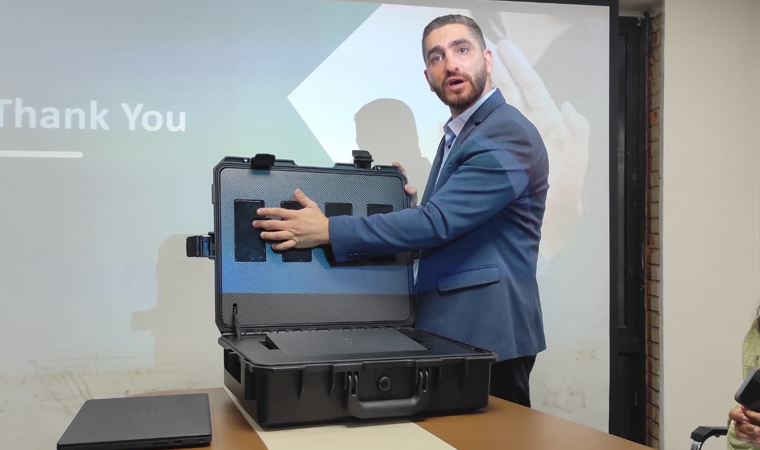Teramox ‘laptop’ rumor: NTA addresses controversy surrounding high-value device

KATHMANDU: Some time ago, there was considerable buzz surrounding a laptop that allegedly cost $50,000 (approximately Rs. 6,645,000) and was acquired by the Nepal Telecommunication Authority for their Telecommunication Traffic Monitoring and Fraud Control System, known as Teramox. The question on everyone’s mind: Is this laptop truly worth its exorbitant price tag?
In response to these concerns, the Nepal Telecommunication Authority convened a press conference and clarify the situation. Chairman of the Nepal Telecommunication Authority Purushottam Khanal explained that this laptop isn’t an ordinary computer; rather, it serves as a crucial drive test device.
He clarified that after a project contract was terminated in 2066 BS, it was subsequently revived by court order. During this reevaluation, the data traffic monitoring aspect required the addition of the drive test device.
Khanal emphasized that no additional payment was made for this equipment, despite its apparent high value. He noted that the $50,000 figure was declared for customs purposes by Vanrise, the company providing the equipment.
He explained, “They have declared the value of the drive test equipment at $50,000 for customs purposes. If it was $2 lakhs, the state would receive only that amount in revenue. It’s essentially a built-in drive test tool that comes with the package.”
A technician from Vanrise Solutions, Mohammad Arb, delivered a presentation to shed light on the technology. He described it as a complete drive test device with special Android testing applications on four handsets that assess the service provider’s network. Arb explained that any issues identified during these tests are transmitted to the laptop within the device.
Arb pointed out that the laptop is equipped with cutting-edge technology and software. “The software is complex,” he continued, “It’s an expensive software used for measuring service quality and user experience. The dashboard displays service accessibility and quality on a map overlaying Google Maps.”
VanRise Solutions has deployed similar systems for regulators in various countries worldwide, including African nations such as Ivory Coast, Guinea, Congo, and Haiti.
Additionally, experts from Vanrise Solutions assured that the Telecommunication Traffic Monitoring and Fraud Control System (TERAMOX) technology is not designed to collect media files or personal data from calls and messages.
It exclusively employs a passive approach for data extraction, relying on basic Call Detail Record (CDR) information agreed upon by the service provider. This information typically includes details such as call duration, numbers dialed, and timestamps.
Arb underlined that this system does not support call tapping, and it does not collect or require personal details or confidential information. “This system is intended solely for regulatory purposes and not for surveillance agencies,” he stated.
Furthermore, media files, such as individual call recordings or SMS content, are neither collected nor requested from service providers. These files remain solely under the control of the service providers.
Chairman Khanal reiterated that the Teramox project aims to establish a systematic, reliable, and regular service. He explained that sections 15 and 17 of the Telecommunication Act empower the authority to collect and inspect data for the purpose of monitoring fraudulent activities. He clarified, “With the help of this system, we are automating this kind of work.”
The implementation of this system will follow the Ministry of Communication and Information Technology’s instructions, which include the creation of an MoU or specific procedures with service providers.
Khanal also emphasized that detailed records of discussions and coordination with service providers regarding Teramox have been maintained.
Khanal shed light on the urgency of implementing Teramox by highlighting the drastic increase in data usage, network expansion, and SIM sales since 2017.
Despite these advancements, revenue has decreased by 25 billion since 2074/75 BS. He expressed concerns that if this trend continues, Nepal’s telecommunication sector could face dire consequences within the next few years.
Chairman Khanal firmly asserted that the Teramox system is essential to establish a solid foundation for compensating customers accurately. He elaborated, “In parallel, it involves passive monitoring of the service provider’s infrastructure and signal. This press conference was organized to provide clarity on the technical aspects, as experts from the company are here.”












Facebook Comment